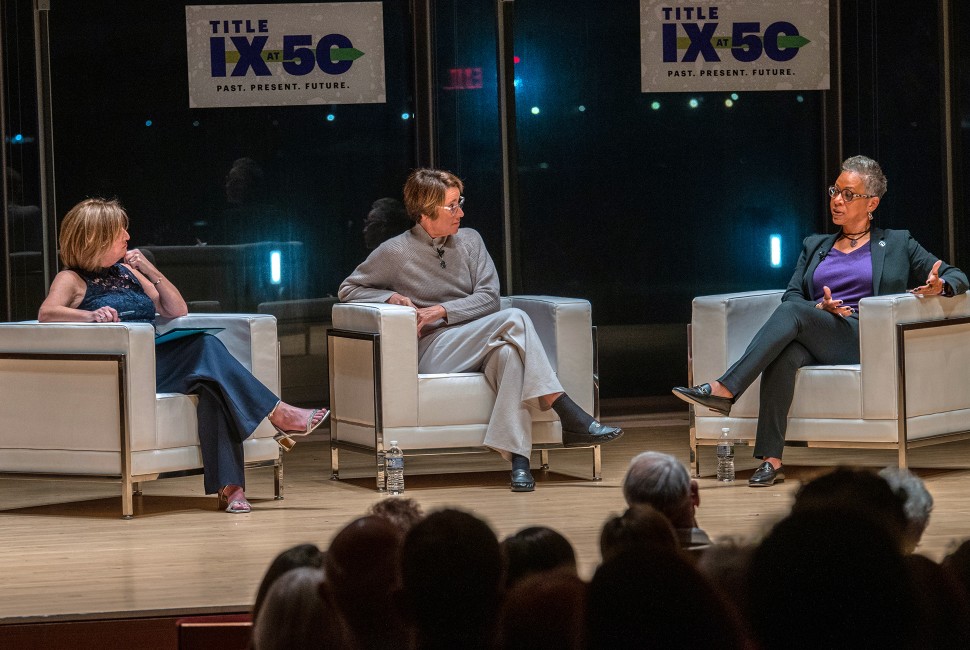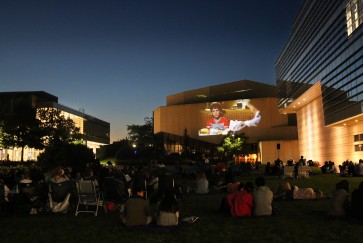“No person in the United States shall, on the basis of sex, be excluded from participation in, be denied the benefits of, or be subjected to discrimination under any education program or activity receiving Federal financial assistance.”
– Title IX of the Education Amendments of 1972
Mary Carillo, a tennis champion who broke barriers in covering men's sports and is widely considered one of the best sportscasters in the country, and Northwestern alumna Katrina Adams ’89, the first African American president and CEO of the United States Tennis Association (USTA), who won the NCAA doubles title with partner Diane Donnelly in 1987, yesterday shared their personal experiences as women who came of age around the time of the passage of Title IX in 1972.
At the opening event of Northwestern’s “Title IX at 50,” they highlighted the importance of knowing the history of Title IX and talked about efforts yet ongoing to find a level playing field for women — on and off the court.
“In 2022, Title IX is the only law of any kind that grants equality to women. The only one,” said Medill professor Melissa Isaacson, lead organizer of “Title IX at 50,” which continues today and tomorrow. Isaacson moderated what was, at times, a comedic conversation with Adams and Carillo before a packed house in Bienen’s Galvin Recital Hall, drawing University leaders, scholars, athletes, advocates, players, coaches and more from Northwestern and beyond.
To see full schedule of events, visit “Title IX at 50: Past. Present. Future.”
Northwestern President Michael Schill “bragged” to the audience about the fact that of Northwestern’s 19 athletic teams, 11 are women’s teams, with 248 student-athletes, who have been “nothing less than spectacular.” He noted the historic records of several, including field hockey, lacrosse, tennis, softball and basketball.
While president of the University of Oregon, Schill attended most of the women’s basketball games. The women’s team, he said, captured the college athletic ideal with players driven by a love of the sport, their school and their teammates.
In his welcoming remarks, Charles Whitaker, dean of the Medill School of Journalism, Media, Integrated Marketing Communications, acknowledged the advances made since Title IX was passed.
“But make no bones about it, we still have a long way to go,” he said. “We have glass ceilings remaining to be shattered, but I’m happy to come together this weekend to reflect on the progress that has been made, and I look forward to celebrating the remaining barriers to full equality that will come tumbling down, hopefully in my lifetime, though I am very, very old.”
A Black woman from the West Side of Chicago, whose parents came from Mississippi and chose not to talk much about race in their home, Adams’ most eye-opening experiences with inequality came with the realization that she could be a champion.
“Our sport, the sport of tennis, taught me I was going to be the minority,” Adams said, recalling big tournaments, where she was the only Black player. She spoke about her more recent experience on the business side on tennis, as often the only person of color.
“When I took the helm at the USTA, I knew I had to be twice as good, I knew I had to represent, and I knew all eyes were on me,” she said. “I never had a hair out of place, and I still don’t.”
When Carillo, a self-proclaimed tomboy, was young, tennis was the only sport you could occasionally see women playing on TV. She grew up three blocks away from John McEnroe in Queens, New York, where the two played tennis as children. When Carillo was 11 and McEnroe was 9, she started losing matches.
Beloved for her storytelling acumen and raw authenticity, Carillo talked about the importance of having “male sponsors” as she built her sportscasting career in what remains, in many ways, male dominated.
“I got all my breaks from men because they were the ones in power,” Carillo said, with a nod to the much-improved representation of women in her field, allowing women to lean on other women.
Added Adams: “It’s so important that we as women are reaching back. Too often we are squashing ourselves because we don’t want someone to take our place.” The speakers praised the women athletes of today for continuing their work to level the playing field.
President Schill, a Yale University-trained attorney and legal scholar and longtime university administrator, read the full text of Title IX — only 37 words in its entirety.
“This statute, sometimes called ‘37 words that changed America,’ has had an amazing impact,” he said.


